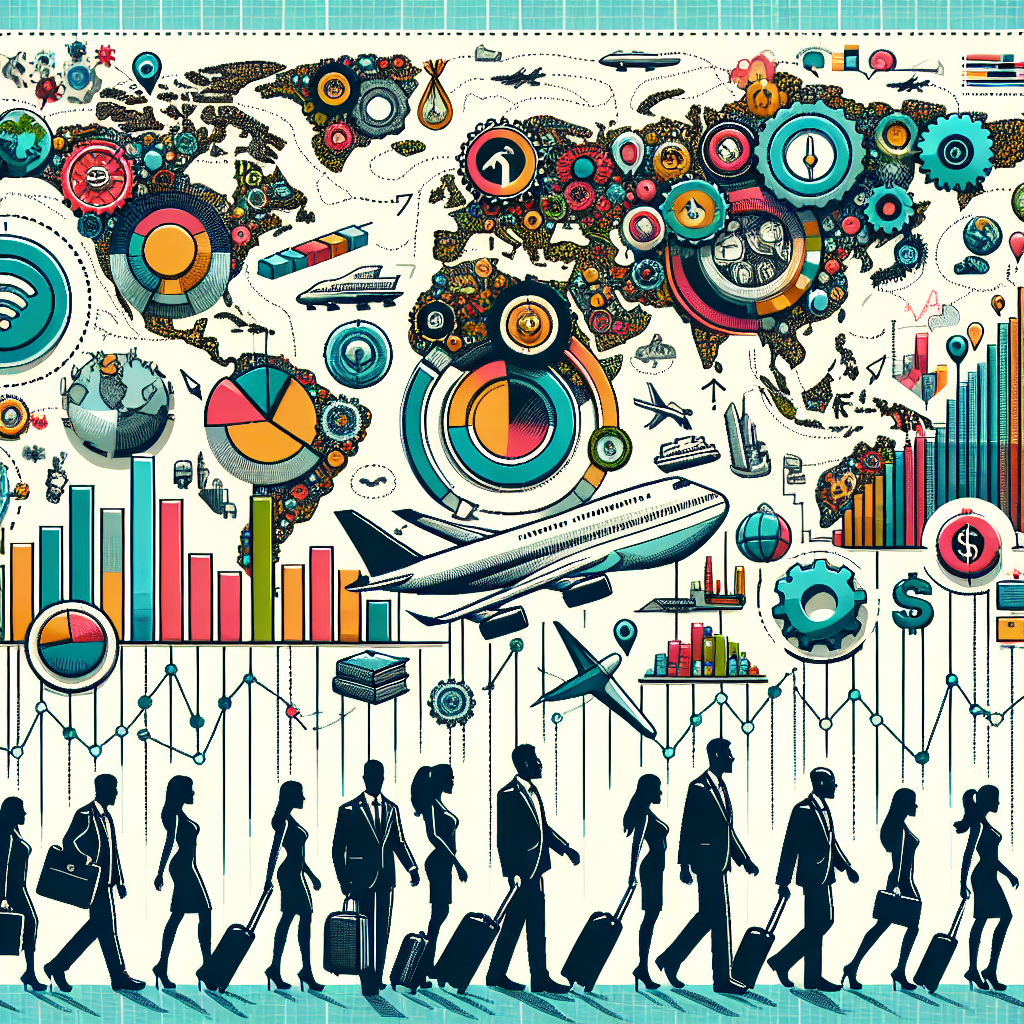The tourism industry is a dynamic and ever-evolving sector that plays a crucial role in the global economy. By exploring the latest trends and developments within this thriving industry, we can gain valuable insights into how it impacts the economic landscape. From the rise of eco-tourism to the increasing popularity of experiential travel, there are countless factors shaping the future of tourism. This article aims to delve deep into the dynamics of tourism industry trends and provide a comprehensive analysis of their significant impact on the economy. Join us as we unveil the fascinating world of tourism and discover the economic implications of its growth.
Understanding Tourism Industry Trends
Shift towards Sustainable Tourism
- Importance of eco-friendly practices: The tourism industry is witnessing a significant shift towards sustainability, with a growing emphasis on environmentally friendly practices. This includes initiatives to reduce carbon footprints, promote wildlife conservation, and support local communities.
- Rise of ecotourism destinations: There has been a notable increase in the popularity of ecotourism destinations that offer travelers the opportunity to engage with nature responsibly. These destinations prioritize conservation efforts and provide educational experiences for visitors.
Tech Integration in Tourism
- Influence of AI and data analytics: Technology, particularly artificial intelligence and data analytics, plays a crucial role in shaping the modern tourism industry. Businesses utilize these tools to personalize customer experiences, optimize pricing strategies, and forecast trends.
- Virtual reality experiences for travelers: The integration of virtual reality technology has revolutionized the way travelers explore destinations before making bookings. Virtual tours, interactive maps, and immersive experiences have become increasingly popular among tech-savvy tourists.
Economic Impact of Tourism Industry Trends

Revenue Generation
- Revenue Generation: The tourism industry’s trends play a pivotal role in revenue generation for a country’s economy. The influx of tourists leads to increased spending on accommodation, food, transportation, and entertainment, contributing significantly to the overall economic activity.
- Contribution to GDP growth: The steady growth of the tourism sector directly impacts the Gross Domestic Product (GDP) of a nation. As tourism trends evolve, the GDP sees a positive correlation, reflecting the industry’s substantial contribution to the economy.
- Employment opportunities in the tourism sector: The dynamic trends in the tourism industry create a demand for a diverse range of services, thereby generating employment opportunities. From tour guides to hotel staff, the sector offers jobs to a wide spectrum of individuals, fostering economic growth and stability.
Infrastructure Development
- Infrastructure Development: The evolving trends in the tourism industry necessitate continuous investment in infrastructure to accommodate the increasing number of tourists. This includes the development of hotels, resorts, transportation networks, and recreational facilities, leading to overall economic growth.
- Investment in hospitality and transportation: The demand for quality accommodation and efficient transportation services driven by tourism trends drives investments in the hospitality and transportation sectors. This not only enhances the visitor experience but also stimulates economic development in related industries.
- Enhancing local communities through tourism: The development of infrastructure to support tourism trends often extends beyond tourist hotspots, benefiting local communities by creating job opportunities, improving amenities, and fostering sustainable development practices.
Foreign Exchange Earnings
- Foreign Exchange Earnings: Tourism industry trends have a direct impact on a country’s foreign exchange earnings. As more tourists visit a destination, there is a significant inflow of foreign currency through expenditures on various goods and services.
- Boosting foreign currency reserves: The continuous growth of tourism trends contributes to boosting a nation’s foreign currency reserves. This influx of foreign exchange not only strengthens the country’s financial position but also provides stability in the face of economic uncertainties.
- Balancing trade deficits through tourism revenue: The revenue generated from tourism plays a crucial role in balancing trade deficits by offsetting imports with the income generated from foreign visitors. This helps in stabilizing the overall economic performance of a country.

Challenges and Opportunities in the Tourism Sector
Overtourism Concerns
- The surge in global tourism has led to overtourism concerns in many popular destinations, where the sheer volume of visitors is straining local resources and infrastructure.
- This phenomenon not only threatens the authenticity of local culture but also poses significant environmental challenges, such as pollution and habitat degradation.
- To address these challenges, destination management organizations are implementing strategies to manage tourist influx sustainably, including promoting off-peak travel, diversifying tourism offerings, and enforcing carrying capacity limits at sensitive sites.
Digital Transformation
- The tourism industry is undergoing a rapid digital transformation, leveraging technology to enhance visitor experiences and streamline operations.
- By harnessing data analytics and artificial intelligence, businesses can personalize services, optimize pricing strategies, and improve overall customer satisfaction.
- However, with the increasing reliance on digital platforms, cybersecurity risks have become a major concern in the tourism sector, necessitating robust measures to safeguard sensitive information and maintain consumer trust.
Post-Pandemic Recovery
- The COVID-19 pandemic has severely impacted the tourism industry, leading to widespread closures, job losses, and economic uncertainty.
- As destinations gradually reopen, tourism businesses are demonstrating resilience by implementing stringent health and safety protocols to rebuild consumer confidence.

- Adapting to changing travel norms and preferences, such as the rise of remote work and sustainable tourism practices, will be crucial for the industry’s long-term recovery and growth.
Policy Implications and Government Initiatives
Promoting Sustainable Tourism Practices
- Implementation of green policies and regulations
Government bodies are increasingly enacting stringent regulations to ensure that tourism activities align with environmental conservation goals. This includes measures such as limiting carbon emissions, waste management requirements, and promoting the use of renewable energy sources within the tourism industry. - Incentivizing eco-friendly tourism businesses
To encourage the adoption of sustainable practices, governments are offering incentives to businesses that demonstrate a commitment to eco-friendly operations. These incentives may include tax breaks, subsidies for implementing green technologies, or preferential treatment in procurement processes for sustainable tourism providers.
Supporting Small and Medium Enterprises
- Financial assistance for tourism startups
Recognizing the importance of small and medium enterprises (SMEs) in driving tourism growth, governments are providing financial support mechanisms such as low-interest loans, grants, or investment schemes specifically tailored for startups in the tourism sector. This aims to foster innovation and diversity within the industry. - Training programs for entrepreneurship in the tourism sector
To equip SMEs with the necessary skills and knowledge to thrive in the competitive tourism landscape, governments are investing in training programs focused on entrepreneurship, business management, and marketing strategies. These initiatives aim to empower small businesses to navigate challenges and seize opportunities in the tourism market effectively.
International Cooperation in Tourism
- Bilateral agreements for tourism promotion
Governments are engaging in bilateral agreements with other countries to promote tourism exchange and collaboration. These agreements may involve mutual marketing campaigns, visa facilitation measures, or joint investment projects aimed at boosting tourist flows between nations and fostering cultural exchange. - Collaborative efforts for cross-border tourism development
Through partnerships and collaborative initiatives, governments are working together to develop cross-border tourism products and experiences that transcend national boundaries. This collaborative approach not only enhances the attractiveness of tourism destinations but also promotes regional economic development through increased visitor spending and job creation in interconnected tourism markets.
Future Outlook for the Tourism Industry
Innovation in Tourism Services
- Integration of AI for personalized travel experiences
- AI technology will revolutionize the tourism industry by offering customized recommendations and tailored experiences based on individual preferences.
- Through AI-powered chatbots and virtual assistants, travelers can receive real-time assistance and personalized suggestions, enhancing their overall journey satisfaction.
- The utilization of big data and machine learning algorithms will enable businesses to analyze consumer behavior patterns and offer targeted services, thereby improving customer engagement and loyalty.
- Growth of niche tourism markets like wellness and adventure travel
- The rising demand for unique and experiential travel options has fueled the growth of niche tourism segments such as wellness retreats and adventure travel.
- Wellness tourism, encompassing activities like spa retreats, yoga tours, and holistic wellness experiences, appeals to health-conscious travelers seeking rejuvenation and relaxation.
- Adventure tourism, including activities like hiking, scuba diving, and wildlife safaris, caters to thrill-seekers and nature enthusiasts looking for adrenaline-pumping experiences in exotic destinations.
Resilience and Adaptability
- Preparedness for global crises and disruptions
- The tourism industry must prioritize building resilience to cope with unforeseen challenges such as natural disasters, pandemics, political instability, and economic downturns.
- Developing robust crisis management plans, implementing flexible booking policies, and diversifying target markets can help mitigate the impact of crises on the tourism sector and support swift recovery.
- Collaborating with government agencies, industry stakeholders, and local communities is essential to establish effective response mechanisms and ensure the industry’s readiness to navigate crisis situations.
- Flexibility in catering to evolving traveler needs
- To remain competitive and meet changing consumer preferences, tourism businesses need to adapt quickly to evolving traveler needs and expectations.
- Embracing digitalization, offering contactless services, and enhancing hygiene protocols are crucial in providing a safe and seamless travel experience for customers post-pandemic.
- Tailoring products and services to cater to diverse demographics, including millennials, Gen Z, and senior travelers, can help capture a wider market share and sustain long-term growth in the industry.
FAQs: Unveiling the Dynamics of Tourism Industry Trends and Their Impact on the Economy
What are some current trends in the tourism industry?
The tourism industry is constantly evolving, with some current trends including the rise of sustainable travel practices, the growth of experiential tourism, and the increasing popularity of technology-based solutions such as virtual reality tours. Additionally, there is a noticeable shift towards personalized and authentic travel experiences, as well as a focus on wellness and health tourism.
How does the tourism industry impact the economy?
The tourism industry plays a significant role in many economies around the world, contributing to job creation, infrastructure development, and foreign exchange earnings. The industry also supports various sectors such as hospitality, transportation, and retail, leading to a multiplier effect that boosts economic growth. In addition, tourism can help diversify economies, particularly in regions heavily dependent on a single industry.
What are some challenges facing the tourism industry in relation to economic impact?
Despite its positive contributions, the tourism industry also faces several challenges that can affect its economic impact. These include geopolitical instability, natural disasters, and global health crises, all of which can lead to decreased tourist arrivals and revenue losses. In addition, issues such as over-tourism, environmental degradation, and socio-cultural impacts can strain local communities and hinder sustainable development.
How can governments and businesses adapt to the changing landscape of the tourism industry?
To adapt to the evolving trends in the tourism industry, governments and businesses can implement strategies such as diversifying tourism offerings, investing in infrastructure and technology, promoting sustainable practices, and supporting community-based tourism initiatives. Collaboration between stakeholders, including public-private partnerships, can help address challenges and leverage opportunities for sustainable growth in the industry.
